Important Warnings That It Is Time To See A Dermatologist

Acne and other breakouts are not the only skin issues people face. They occur frequently. Some skin issues, despite their seeming insignificance, are actually rather significant. Perhaps you have noticed a new mole or a change in an existing one. It is essential to get these disorders checked out by a dermatologist.
When should you see a dermatologist?
To assist you in determining if you need to see dermatology specialists of atlanta, let us talk about some warning signals you should always look for.
- A change in the color, size, form, or symptoms of a mole or other spot on the skin warrants a visit to a dermatologist. Such alterations are also indicative of skin cancer, which is best treated at its earliest possible stage. Your dermatologist can also instruct you on how to perform routine skin checks.
- You have tried over-the-counter treatments, dietary changes, and cleansing methods, yet your acne persists. A dermatologist best treats this skin problem.
- Continuous Red, itchy welts: Is there an allergy involved? Or maybe your skin is infected? Before checking out, please visit the dermatologist. You might advise a different course of treatment or prescribe medication.
- Scars, discoloration, or If you have acne and a scar has formed. As a result, you may want to see a dermatologist. Scarring can sometimes be reduced with the use of medical procedures like microdermabrasion and laser therapy.
- You begin to perspire heavily: Humans have an inbuilt mechanism for perspiring. This is a great technique to chill down while also flushing out pollutants. While perspiration is normal, it is possible to produce too much at times.
- Hyperhidrosis, characterized by excessive sweating, is thought to be a more serious disorder. The symptoms of diabetes and thyroid issues may include excessive perspiration.
- Your rash never goes away: Rash is more likely to be annoying than dangerous. Most rashes can clear up independently after exposure to allergens or other irritants. However, if the rash spreads all over your body and will not go away, you may have a more serious infection.
- Infection by fungi, ingrown toenails, nail disorders, etc. An ingrown nail, fungal infection, or other skin condition typically requires a trip to the dermatologist.
- Sun damage and aging can cause brown spots, but brown spots can also indicate a hormone imbalance. The darkening of the skin around the mouth and nose is common in women, but if it continues to get darker, you should see a dermatologist.
- Have you noticed an increase in the amount of hair on your pillowcase since you began losing your hair? There could be an issue with your scalp, or you could just wish to take precautions against further hair loss.
